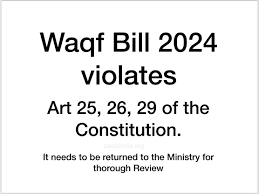Exploring the Waqf Bill 2023 and Its Significance

Introduction
The Waqf Bill 2023 has emerged as a pivotal piece of legislation aimed at modernizing the governance and management of Waqf properties in India. Waqf properties, which are charitable endowments, play a crucial role in supporting educational, religious, and social activities within the Muslim community. With billions of rupees worth of properties under its purview, the effective management of these assets is not just an administrative concern but also a matter of equity and justice. The bill is timely as it seeks to address long-standing issues of mismanagement and lack of transparency in Waqf property administration.
Details and Key Provisions of the Waqf Bill
The Waqf Bill 2023 proposes several significant reforms aimed at revamping the existing framework. One of its primary objectives is to establish a more robust governance structure for Waqfs across the country. This includes the introduction of a comprehensive digital database to track and manage Waqf properties efficiently. The bill mandates that all Waqf properties be registered and their details be made publicly accessible, enhancing transparency and accountability.
Another noteworthy aspect of the bill is the empowerment of Waqf boards. It proposes to give more autonomy to State Waqf Boards in managing properties, enhancing their authority to make decisions regarding rental agreements, sales, and development plans. Furthermore, the bill includes provisions to tackle disputes within the Waqf community, establishing a fast-track dispute resolution mechanism to address grievances in a timely manner.
Concerns and Reactions
While the Waqf Bill has received support for its initiatives aimed at improving property governance, it has also faced criticism from certain quarters. Opponents argue that some provisions may infringe on community rights and may not adequately represent diverse interests within the Waqf sector. There are apprehensions that the increased bureaucratic oversight could deter local community involvement in managing these properties.
Conclusion
In conclusion, the Waqf Bill 2023 marks a significant step towards reforming the way Waqf properties are managed in India. By promoting transparency and empowering local boards, it aims to enhance the efficacy of Waqf management, which could ultimately benefit the communities that rely on these assets. As stakeholders continue to debate its provisions, the successful implementation of the Waqf Bill holds promise for revitalizing a vital aspect of socio-economic welfare in the country. The upcoming discussions in Parliament and the community’s response will be crucial in determining the future of the Waqf sector under this new framework.









